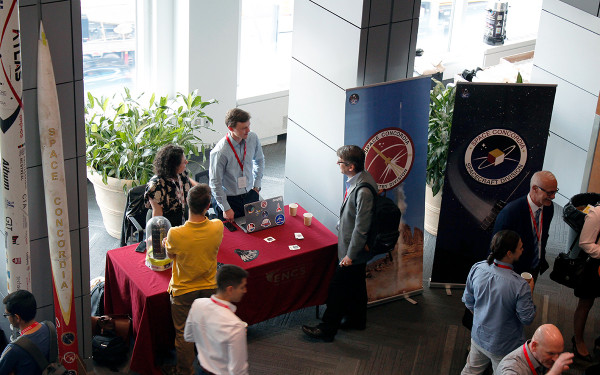Space: The final frontier
Seeing Dollar Signs In Space, The Government Pulls Back
Where outer space once resembled the Old West—an unknown territory of tremendous danger and immeasurable opportunity—it’s now beginning to resemble the commercialized Silicon Valley that grew on what was once unexplored territory.
Concordia electrical and computer engineering professor Scott Gleason has been working on a project that will see the school launch a small Cubesat satellite into space. According to Gleason, the efforts to turn space exploration into a moneymaking venture are not totally a negative thing. There’s more than one way to make a buck in space, and each comes with its own set of problems.
“I think people like [Virgin Group founder] Richard Branson are catering more towards rich people who want to pay a million dollars to go into space,” said Gleason. “I think their priority is just to make money, and not to do some good, which traditionally is what NASA and the Canadian Space Agency will do.”
In 2004, Branson launched Virgin Galactic, a company dedicated to space tourism, where those who can afford it can spend a few hours enjoying weightlessness 100 km above the earth. While this would be the first dedicated space tourism company, to date seven people have paid for the privilege of going to the International Space Station, hitching a ride aboard Russian Soyuz vehicles.
“[Space tourism] is not particularly an interest of mine,” said Gleason. “I’ve got nothing against it. If some rich sheik wants to spend millions of dollars to take a picture of earth, that’s his money. We have some pressing problems now, with climate change and a severe shortage of measurements and science to back it up, we need a lot more infrastructure put into to actually doing environmentally conscious things. I’d much rather see more funding and more satellite missions going to understand the climate, to study the planet, with a good network of systems.”
However, public money for space travel is no longer the priority it once was. NASA has continually been threatened with budget cuts and the continued effects of the recession mean that there is less public patience for expensive missions to space. As a result, space exploration has been largely privatized: corporations have been staking a more significant claim in owning a piece of outer space.
“The commercialization of space has been coming for a while, and some of the situations we’re in right now are very strange,” said Gleason. “You have publically funded projects and privately held data from them. For example, the radar satellites, which are arguably one of Canada’s biggest contributions [to space technology], are owned by MDA Corporation. If you were a Canadian citizen [and your tax dollars were invested into this satellite] you’d think you’d have the right to get some data from it. Turns out you can’t, because MDA owns all the data. This a very interesting trend, because it’s almost like public money isn’t just going to fund big contracts, but the public sector is now being limited as to what the return is.”
If nebulous ties between governments and corporations seem like a bit of déjà vu, it isn’t the only earthly issue that is also slowly migrating to the cosmos. Even warfare is being exported to space.
“Another big issue is the militarization of space,” acknowledged Gleason. “Even RADARSAT, which was initially designed to be a remote [environmental] sensing device, has been used quite a lot for the military. A lot of these new environmental satellites are being used in a dual purpose for their military capability.”
Back on Earth, there is something of a battle over space. There’s an ongoing discussion over cleaning up the outer space version of litter, called space debris, which can pose a danger to missions and orbiting hardware. One of the proposed missions for Concordia’s own Cubesat is to help clean up some of the debris. A secondary mission that’s been proposed is figuring out a way to de-orbit the Cubesat to keep it from becoming space junk itself.
The Concordia Cubesat is part of a larger trend that has seen numerous universities and even high schools take a step into space. Less than 50 years since the two superpowers on the planet spent vast amounts of money and manpower to be the first to put an object into orbit, that ability is becoming accessible to students around the planet.
“The accessibility of space, and why all these schools are doing it, is because it’s not becoming easier to do it, but [the process is] becoming more understandable,” explained Gleason. “You don’t have to be NASA anymore to launch a satellite. Even if you don’t have complete expertise in all the systems, like a high school wouldn’t, you can buy certain things off the shelf for communications or power.”
Looking at the challenges facing humanity in outer space might help us face the problems we have down on Earth. What role are we going to allow corporations to play in our lives? How much leeway do we give to those with the hefty wallets? Like it or not, corporatization will have a role to play, both in schools and in the stars.
Privatization is now the kind of issue that will rear its head more and more, whether you’re walking on campus—or walking on the Moon.
This article originally appeared in Volume 31, Issue 22, published February 8, 2011.





__600_375_90_s_c1.jpg)
2_600_375_90_s_c1.jpg)